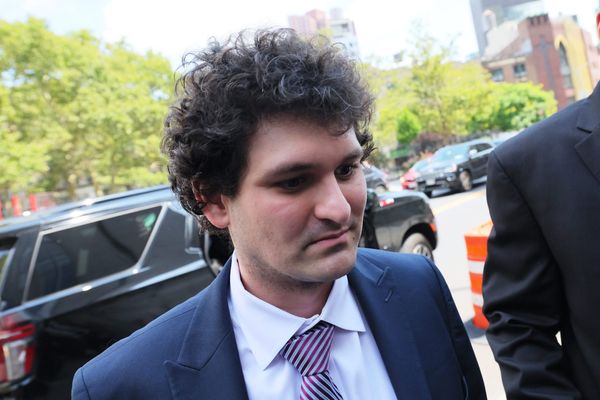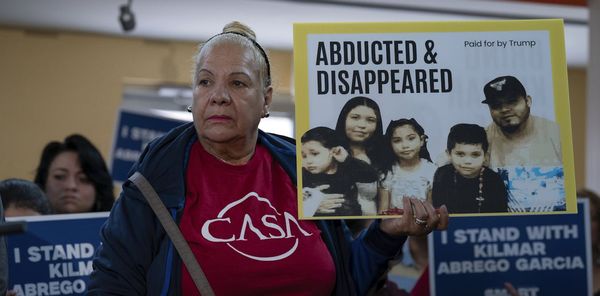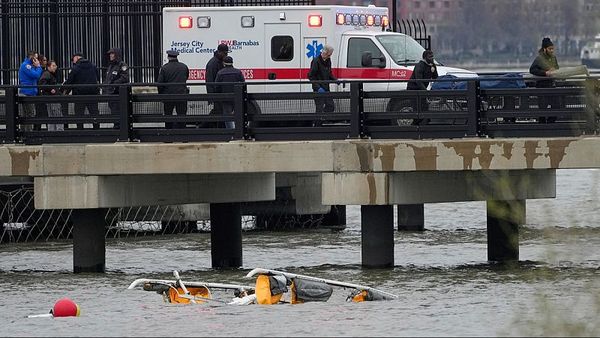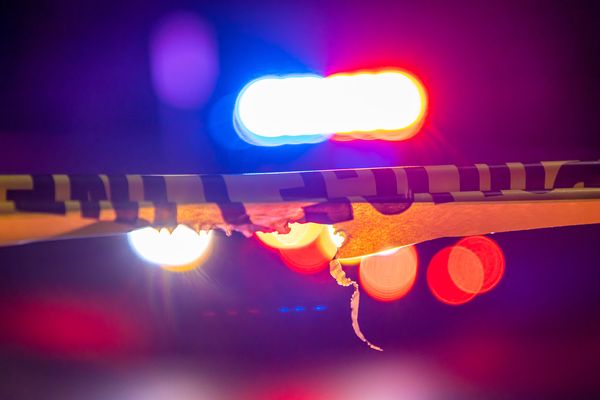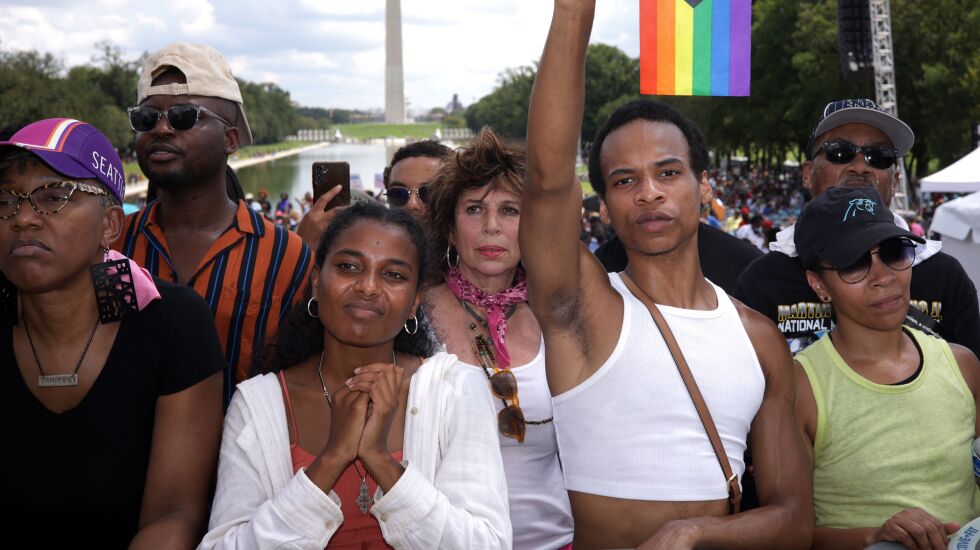
WASHINGTON — Thousands converged on the National Mall on Saturday for the 60th anniversary of Rev. Martin Luther King Jr.’s March on Washington, saying a country that remains riven by racial inequality has yet to fulfill his dream.
“We have made progress, over the last 60 years, since Dr. King led the March on Washington,” said Alphonso David, president and CEO of the Global Black Economic Forum. “Have we reached the mountaintop? Not by a long shot.”
The event is convened by the Kings’ Drum Major Institute and the Rev. Al Sharpton ’s National Action Network. A host of Black civil rights leaders and a multiracial, interfaith coalition of allies will rally attendees on the same spot where as many as 250,000 gathered in 1963 for what is still considered one of the greatest and most consequential racial justice and equality demonstrations in U.S. history.
Inevitably, Saturday’s event was shot through with contrasts to the initial, historic demonstration. Speakers and banners talked about the importance of LGBTQ and Asian American rights. Many who addressed the crowd were women after only one was given the microphone in 1963.
Pamela Mays McDonald of Philadelphia attended the initial march as a child. “I was 8 years old at the original March and only one woman was allowed to speak — she was from Arkansas where I’m from — now look at how many women are on the podium today,” she said.
For some, the contrasts were bittersweet. “I often look back and look over to the reflection pool and the Washington Monument and I see a quarter of a million people 60 years ago and just a trickling now,” said Marsha Dean Phelts of Amelia Island, Florida. “It was more fired up then. But the things we were asking for and needing, we still need them today.”
As speakers delivered messages they were overshadowed by the sounds of passenger planes taking off from Ronald Reagan National Airport. Rugby games were underway along the Mall in close proximity to the Lincoln while joggers and bikers went about their routines.
On Friday, Martin Luther King III, who is the late civil rights icon’s eldest son, and his sister, Bernice King, visited their father’s monument in Washington.
“I see a man still standing in authority and saying, ‘We’ve still got to get this right,’” Bernice said as she looked up at the granite statue.
Featured speakers include Ambassador Andrew Young, the close King adviser who helped organize the original march and who went on to serve as a congressman, U.N. ambassador and mayor of Atlanta. Leaders from the NAACP and the National Urban League are also expected to give remarks.
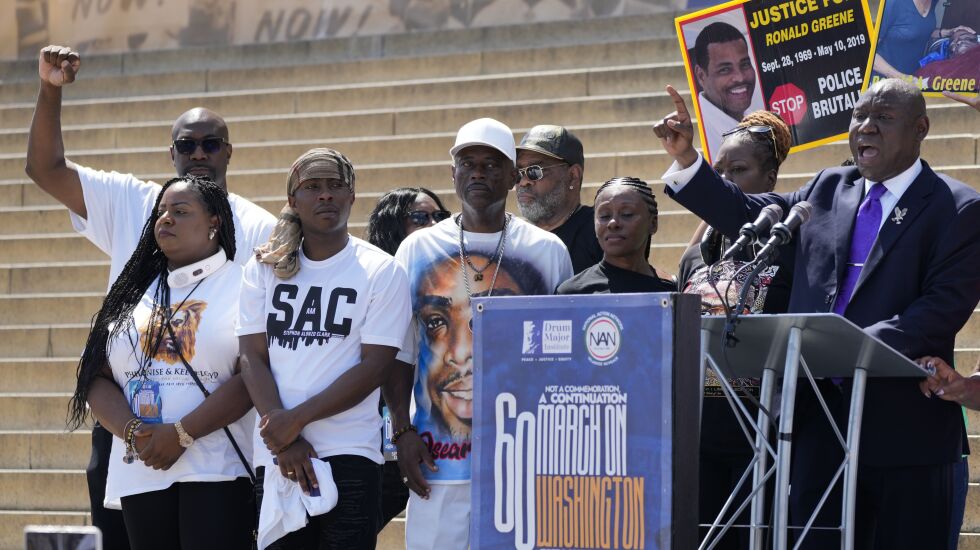
Several leaders from groups organizing the march met Friday with Attorney General Merrick Garland and Assistant Attorney General Kristen Clarke of the civil rights division, to discuss a range of issues, including voting rights, policing and redlining.
The gathering Saturday was a precursor to the actual anniversary of the Aug. 28, 1963 March on Washington. President Joe Biden and Vice President Kamala Harris will observe the march anniversary on Monday by meeting with organizers of the 1963 gathering. All of King’s children have been invited to meet with Biden, White House officials said.
For the Rev. Al Sharpton, founder of the National Action Network, continuing to observe March on Washington anniversaries fulfills a promise he made to the late King family matriarch Coretta Scott King. Twenty-three years ago, she introduced Sharpton and Martin Luther King III at a 37th anniversary march and urged them to carry on the legacy.
“I never thought that 23 years later, Martin and I, with Arndrea, would be doing a march and we’d have less (civil rights protections) than we had in 2000,” Sharpton said, referring to Martin Luther King III’s wife, Arndrea Waters King.
Martin Luther King Jr.’s Washington remarks have resounded through decades of push and pull toward progress in civil and human rights. But dark moments followed his speech, too.
Two weeks later in 1963, four Black girls were killed in the 16th Street Baptist Church bombing in Birmingham, Alabama, followed by the kidnapping and murder of three civil rights workers in Neshoba County, Mississippi the following year. The tragedies spurred passage of the Civil Rights Act of 1964.
The voting rights marches from Montgomery to Selma, Alabama, in which marchers were brutally beaten while crossing the Edmund Pettus Bridge in what became known as “Bloody Sunday,” forced Congress to adopt the Voting Rights Act of 1965.
“Unfortunately, we’re living in a time when there’s a younger generation who believes that my daddy’s generation, and those of us who came after, didn’t get enough done,” Bernice King said. “And I want them to understand, you are benefiting and this is the way you’re benefiting.”
She added: “We can’t give up, because there’s a moment in time when change comes. We have to celebrate the small victories. If you’re not grateful, you will undermine your progress, too.”
Saturday’s gathering gave Denorver Garrett, 31, hope.
He walked around the Lincoln Memorial on Saturday, carrying a cross with names of victims of police brutality and gun violence. “I’ve lost a lot of friends to gun violence and God put it on my heart to carry this cross and turn my pain into something,” Garrett said. “This fight though, has gotten very hard over time and hearing people who are united for the betterment of our people and communities—it’s recharged me to continue and I’m glad I came.”
Associated Press journalists Ayanna Alexander, Gary Fields, Jacquelyn Martin, and Nicholas Riccardi in Denver contributed to this report.
